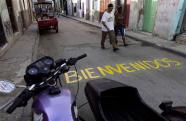Cuban Government Will Close Free Cafeterias
- Submitted by: admin
- Business and Economy
- 09 / 26 / 2009

The Cuban government plans to close free cafeterias in state ministries and instead give employees a stipend to buy food.
Under the program, designed to save money for Cuba's cash-strapped government, workers who ate free or for little cost in their government jobs instead will receive about 70 U.S. cents a day — a significant amount in a country where the average monthly salary is $19.
The pilot program announced Friday will start Oct. 1 for the ministries of Work, Finance, Commerce and Economy. If successful, it will be extended nationwide, the Communist Party daily Granma said.
The move represents a change in philosophy for the communist-run government, which dominates the island's economy and micromanages many aspects of Cubans' lives — from rationing food to determining who can own a car.
Cuba's always-fragile economy has been hit hard by the global financial crisis. About 3 million state employees eat at government cafeterias daily, according to the paper.
President Raul Castro, who took over from elder-brother Fidel in February 2008, has said he wants to streamline the country's stifling bureaucracy and put a measure of decision-making in the hands of citizens.
The newspaper insisted that the idea is not to take away a benefit, but rather "to open the doors to rationality and to savings, and to free the country from a weight that it cannot continue to bear."
A simple meal like a pork sandwich costs about 25 cents, while pasta bought at a street vendor runs about 50 cents — meaning some workers could save money, depending on what they eat.
Source: AP
Under the program, designed to save money for Cuba's cash-strapped government, workers who ate free or for little cost in their government jobs instead will receive about 70 U.S. cents a day — a significant amount in a country where the average monthly salary is $19.
The pilot program announced Friday will start Oct. 1 for the ministries of Work, Finance, Commerce and Economy. If successful, it will be extended nationwide, the Communist Party daily Granma said.
The move represents a change in philosophy for the communist-run government, which dominates the island's economy and micromanages many aspects of Cubans' lives — from rationing food to determining who can own a car.
Cuba's always-fragile economy has been hit hard by the global financial crisis. About 3 million state employees eat at government cafeterias daily, according to the paper.
President Raul Castro, who took over from elder-brother Fidel in February 2008, has said he wants to streamline the country's stifling bureaucracy and put a measure of decision-making in the hands of citizens.
The newspaper insisted that the idea is not to take away a benefit, but rather "to open the doors to rationality and to savings, and to free the country from a weight that it cannot continue to bear."
A simple meal like a pork sandwich costs about 25 cents, while pasta bought at a street vendor runs about 50 cents — meaning some workers could save money, depending on what they eat.
Source: AP
Comments